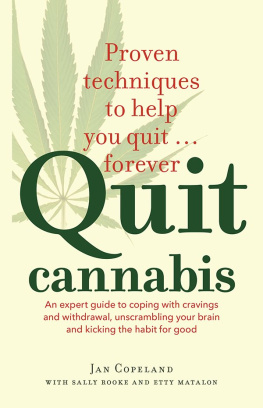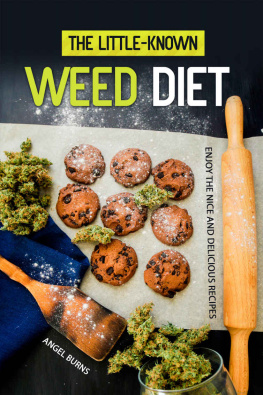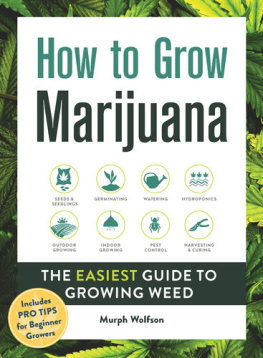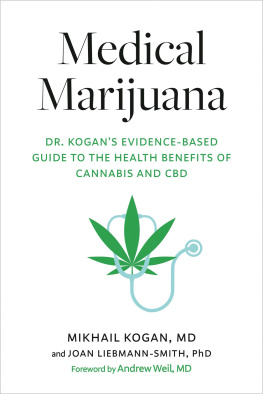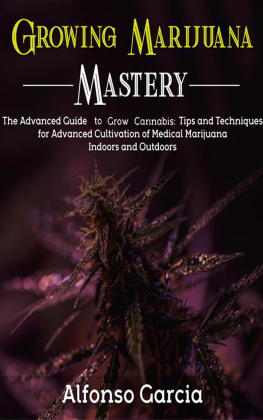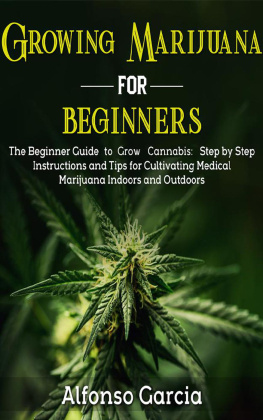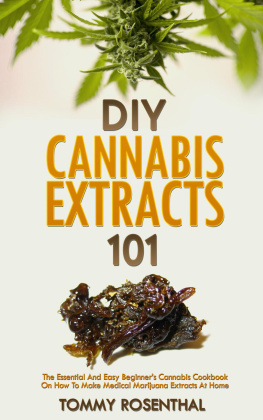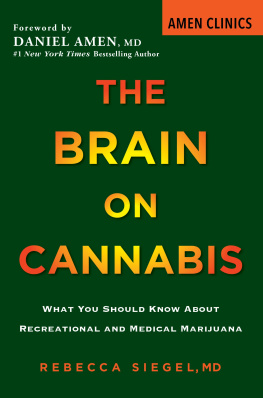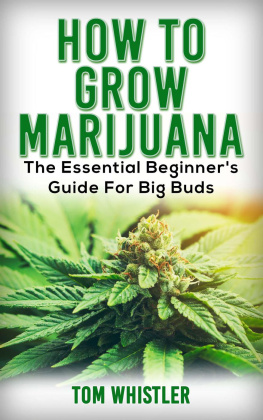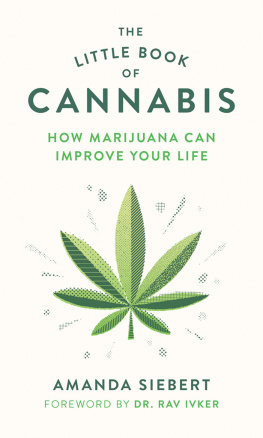
Quit Cannabis: An expert guide to coping with cravings and withdrawal, unscrambling your brain and kicking the habit for good is destined to be among this years most helpful books about the drug.... Parents, adolescents, teachers, counsellors, and the general public will find highly readable explanations about cannabis, nicely illuminated by many personal stories and anecdotes. Step-by-step guidelines are included for those who are struggling with a cannabis use disorder and for those who seek guidelines for how to express their concern. This book is particularly valuable because the wisdom in its pages is based on science, not folklore.
Professor Roger Roffman, Professor Emeritus, School of Social Work, University of Washington, Seattle, USA and author of Marijuana Nation.
For anyone contemplating entering into a consuming relationship with marijuana, or desirous of getting out of one yourself, or of helping someone else you care about get out of or to avoid getting into onethen this is the book to accompany you on that journey. Written with a caring and compelling sense of purpose, it is not only the Inconvenient Truth to the slogan chanting cannabis is a harmless herb of the pot promoters, but a compassionate and practical road map to help navigate and avoid the pitfalls and consequences of its use. Highly recommended.
Bob Hopkins, founder of the Australian Hemp Embassy in Nimbin, NSW and the MardiGrass festival Australia.
Engagingly written by three experts with an international reputation, this book shows how to identify and successfully change cannabis use problems.
Eva Hoch, PhD, Department for Addictive Behaviours and Addiction Medicine, Heidelberg University.
If you were going to read just one book on cannabis make it this one. Copeland and colleagues shine a light on the worlds favourite and most misunderstood drugif you think that cannabis is not addictive think again. This book is written in a style that will appeal to any reader whether its the adolescent cannabis user, the parent, the drug treatment professional, or the addiction expertall of these will find something new in the authors accumulated decades of experience.
Neil McKeganey, PhD FRSA, Director, Centre for Drug Misuse Research, Glasgow, Scotland.
... provides a breath of fresh air and clarity for those trying to make sense of the complex and conflicting dialogue on cannabis (marijuana).... a concise, easy to read, scientific, yet commonsense perspective on the worlds favorite drug.
Alan J. Budney, PhD Professor, Geisel School of Medicine at Dartmouth DH Addiction Treatment and Research Program, New Hampshire, USA.
First published in 2015
Copyright Jan Copeland, Sally Rooke and Etty Matalon 2015
All rights reserved. No part of this book may be reproduced or transmitted in any form or by any means, electronic or mechanical, including photocopying, recording or by any information storage and retrieval system, without prior permission in writing from the publisher. The Australian Copyright Act 1968 (the Act) allows a maximum of one chapter or 10 per cent of this book, whichever is the greater, to be photocopied by any educational institution for its educational purposes provided that the educational institution (or body that administers it) has given a remuneration notice to the Copyright Agency (Australia) under the Act.
Allen & Unwin
83 Alexander Street
Crows Nest NSW 2065
Australia
Phone: (61 2) 8425 0100
Email:
Web: www.allenandunwin.com
Cataloguing-in-Publication details are available from the National Library of Australia
www.trove.nla.gov.au
ISBN 978 1 74331 992 5
eISBN 978 1 74343 977 7
Typeset by Midland Typesetters, Australia
Contents
Jan Copeland is the founding Professor and Director of the National Cannabis Prevention and Information Centre (NCPIC) at the University of New South Wales (UNSW Australia). She has pioneered a range of studies developing brief interventions for cannabis-related problems for adults and adolescents, and has led the development of a program of work that measures and treats cannabis withdrawal with cannabinoid medications and cognitive behavioural treatment. Jan works with a number of community-based agencies on service evaluations and executive management. She is a member of the Australian Psychological Society, the Australian Professional Society on Alcohol and Drugs, the International Cannabinoid Research Society, the International Society for Research on Internet Interventions and the US College on Problems of Drug Dependence, where she serves as the Chair of the colleges International Research Committee. She is on the editorial board of a number of international journals and is an Associate Editor of the leading US journal Drug and Alcohol Dependence.
Sally Rooke joined NCPIC in September 2008. She has led a range of projects developing and evaluating the effectiveness of a web-based treatment for individuals who wish to reduce their cannabis use, web-based assessments and brief advice, and a smartphone application for cannabis use problems. She completed a PhD in psychology, examining the decision-making processes that lead to adolescent and adult substance use. She has led studies on the effects of graphic warning for tobacco and cannabis, and the characteristics of successful and unsuccessful quitters.
Etty Matalon is a clinical psychologist and the National Clinical Training Manager for the NCPIC. She was the state president of the Australian Association for Cognitive and Behaviour Therapy for five years. She has more than 20 years clinical experience in the field of alcohol and other drugs in a range of settings. Throughout her career, she has worked closely with the Australian National Drug and Alcohol Research Centre at UNSW Australia and has provided clinical services in relation to several trials and clinical expertise to several publications.
A remarkable series of events has occurred in the science and politics of cannabis over the past 30 years.
In an interesting paradox, science has revealed startling things about how cannabis affects the brain, and how it can have an impact on motor skills, memory, lung function, and IQ, yet there is simultaneously a growing public acceptance of the drug. Its a strange asymmetry that can be explained partly by the fact that cannabis, like tobacco, appears to show its greatest dangers over a long period of time compared with many other drugs.
The growing public perception that marijuana is a safe drug, particularly among teens, can also be explained by the growing, well-financed normalisation campaign that has picked up steam in the past few decades. Promising everything from lower crime to government taxation windfalls, legalisation campaigners have contributed to the increasingly acceptable social norm that cannabis use should be embraced and legitimised. There are of course real concerns stemming around social justice that we should all care about, but many are asking if the wisest route is to repeat for cannabis, the same policy we have had for alcohol. The recent success of legitimisation campaigns about cannabis has had many repercussions.
One of those consequences does not get spoken about oftenit is not the societal-level effects of such normalisation, but rather the effects on the individual. How does a casual societal attitude affect the person who does have a cannabis problem and is trying to wrestle with it? And how much do cannabis problems have to do with todays high-potency varieties and the way young people are now ingesting the substance? Beyond the big policy questions that are painted across newspapers and websites today are some more fundamental issues that parents and young people grapple with every day: Will I be a hypocrite if I tell my child not to use cannabis even though I once did? Am I a hypocrite for using alcohol in front of my children while I admonish them for using cannabis? And it is not just parents who deal with hard questions when it comes to this drug. Kids often wonder, Is cannabis really that harmful at all? How does cannabis compare with tobacco? Does cannabis make me a safer driver? Unlike heroin, cannabis doesnt kill people, so what is the big deal anyway?
Next page
